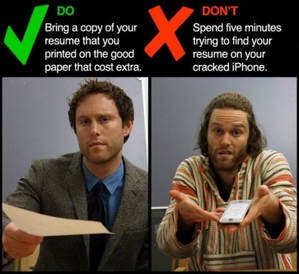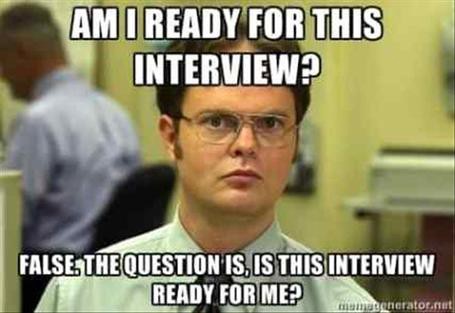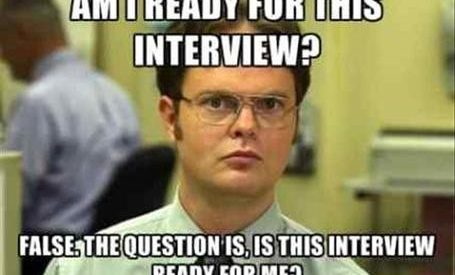
?If you are here, you probably already have a Data Science interview scheduled and are looking for tips on how to prepare so you can crush it. If that?s the case, congratulations on getting past the first two stages of the recruitment pipeline. You have submitted an application and your resume, and perhaps done a take home test. You?ve been offered an interview and you want to make sure you go in ready to blow the minds of your interviewers and walk away with a job offer. Below are tips to help you prepare for your technical phone screens and on-site interviews.
Read the Job Description for the Particular Position You are Interviewing for
Data Scientist roles are still pretty new and the responsibilities vary wildly across industries and across companies. Look at the skills required and the responsibilities for the particular position you are applying for. Make sure that the majority of these are skills that you have, or are willing to learn. For example, if you know Python, you could easily learn R if that?s the language Data Scientists at Company X use. Do you care for web-scraping and inspecting web pages to write web-crawlers? Does analyzing text using different nlp modules excite you? Do you mostly want to write queries to pull dataca from SQL and NoSQL databases and analyse/build models based on this data? Set yourself up for success by leveraging your strengths and interests.
?

Review your Resume before each Stage of the Interviewing Process
Most interviews will start with questions about your background and how that qualifies you for the position. Having these things at the tip of your fingers will allow you allow you to ease into the interview calmly as you won?t be fumbling for answers. Use this time to calm your nerves before the technical questions begin.
Additionally, review your projects and be prepared to talk about the Data Science process you used to design your project. Think about why you chose the tools that you used, the challenges that you encountered along the way, and the things that you learned along the way.
Look at GlassDoor for Past Interview Questions
If you are interviewing for a Data Scientist role at one of the bigger companies, chances are they?ve already interviewed other people before you, who may have shared these questions on GlassDoor. Read them, solve them, get a feel of the questions you will be asked. If you cannot find previous questions for a particular company, solve the data science questions from other companies. They are similar, or at the very least, correlated.
Moreover, even if there are no data science questions for that particular company, see what kind of behavioral questions are asked.
Ask the Recruiter about the Structure of the Interview
Recruiters are often your point of contact with the company you are interviewing at. Ask the recruiter questions about how your interview will be structured, what resources you should use when preparing for your interview, what you should wear to the interview, and even the names of your interviewers so you can stalk look them up on LinkedIn and see their areas of specialization.
Do Mock Interviews
Interviewing can be nerve-racking, more so when you have to whiteboard technical questions. If possible, ask for mock interviews from people who have been through the process before so you know what to expect. If you cannot find someone to do this for you, solve questions on a white board or notebook so you get the feel of writing algorithms some place other than your code editor.
Practice asking questions to understand the scope and constraints of the problem you are solving. Once you are hired, you will not be a siloed data scientist. It is reasonable to bounce around ideas and see if you are on the right track. It is not always about getting the correct answer, which often does not exist, but about how you think through problems, and how you work with other people as well.
?

Is your data science interview ready for you!
Practice the Skills that you Will be Tested On
Your preparation should be informed by the job description and the conversation with recruiters. Study the topics that you know will be on the interview. Look up questions for each area in books and online. Review your statistics, machine learning algorithms, and programming skills.
- Some positions will want you to have really good programming skills and will not shy away from asking questions usually asked to software engineers. If applying for a programing heavy position, Cracking the Coding Interview is a good resource to practice these skills.
- Other positions will need you to have really good statistical skills, an understanding of different population distributions, experimental design, A/B testing and hypotheses testing.
- Most positions will test for your ability to communicate why any of this matters. At the end of the day, Data Science should help inform business decisions to increase efficiency, profitability, etc. Keep the business understanding part of the CRISP DM process in mind throughout your problem solving.
Additionally, Spring Board has compiled a list of 109 commonly asked Data Science Questions.
KDnuggets also has a list of 21 must know Data Science Interview Questions and Answers.
Follow Up with Thank You Emails
This is probably standard etiquette for any interview but remember to send a personalized thank you email within 24 hours of your interview. Also, if you have thought of the perfect answer to that question you couldn?t solve during your interview, include it as well. Don?t forget to express your enthusiasm for the work that Company X does and your desire to work for them.
Repeat
If you get an offer after your first round of data science interviews, Congratulations! Close this tab and grab a beer. If you are turned down, like most of us are, use the lessons you learned from your past interviews to prepare for your next interviews. Interviews are a good way to identify your areas of weakness, and consequently become a better candidate for future openings. It?s important to stay resilient, patient, and keep a learner?s mindset. Statistically, you probably won?t get an offer for each position you apply for. Like the excellent data scientist you are, debug your interviewing process and up your future odds.
Additional Resources:
- Erin Shellman?s Crushed it! Landing a data science job
- Trey Causey?s What it?s like to be on the data science job market
- Contingency plan: Arm yourself with some humor in case your interview goes completely south by watching Silicon Valley?s Hot Dog, not Hot Dog Classifier
Other Great Data Science Blog Posts To Help Make You A Better Data Scientist!
How To Ensure Your Data Science Teams And Projects Succeed!Why And How To Convince Your Executives To Invest in A Data Science Team?


